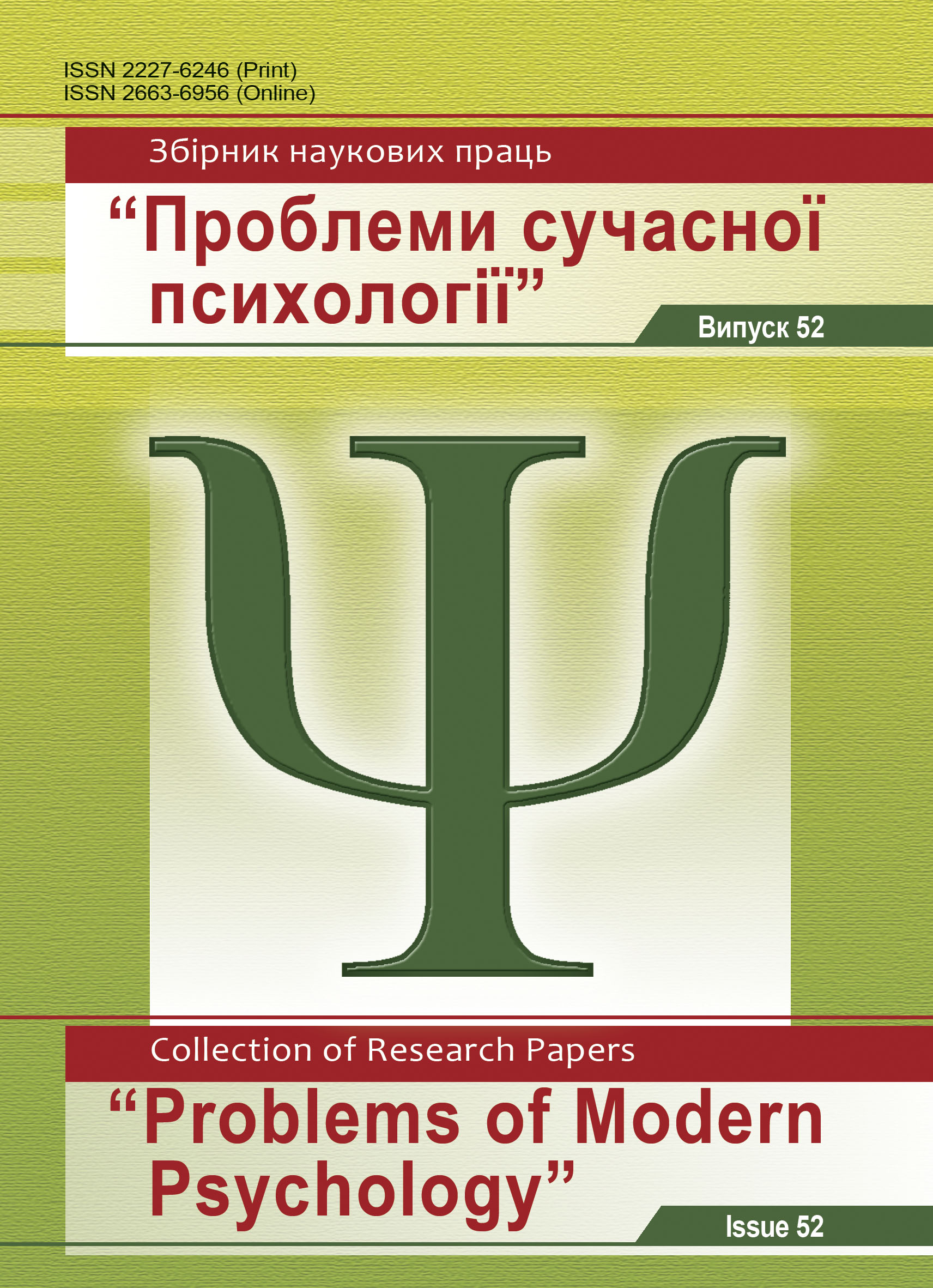Рольові техніки як засіб формування компетентності фахівця
DOI:
https://doi.org/10.32626/2227-6246.2021-52.159-181Ключові слова:
компетентність, компоненти компетентності, рольова компетентність,, рольові техніки, фахівець закладів освітиАнотація
У статті подано характеристику структурних компонентів компетентності фахівця закладів освіти, систематизовано техніки, що сприяють їх розвитку.
Мета статті – описати рольові техніки, спрямовані на формування компетентності фахівця закладу освіти.
Методи та методики дослідження. У дослідженні використано метод теоретичного аналізу наукової літератури; метод синтезу; конструктивний метод; метод узагальнення.
Результати дослідження. Перелік рольових технік, спрямованих на розвиток компонентів компетентності, містить як авторські методики, так і модифіковані, що ґрунтуються на теорії поля К. Левіна і теоретичних засадах рольового підходу, поданих у працях П. Горностая. Крім того, пропонуємо використовувати рольові техніки, розроблені й апробовані в межах психодрами Я. Морено й А. Шутцендергер.
Систематизовані нами рольові техніки сприяють формуванню в особистості: усвідомлення власної цінності й унікальності («Домінантні ролі», «Побудова рольового атому особистості», «Регіони ролі»); уміння долати негативні наслідки механізму відчуження, що панує в сучасному соціумі, виявляти сильні та слабкі сторони своєї особистості, інтегруючи їх у цілісне Я («Я – це хто?», «Метафора»); здатності долати стереотипи поведінки та корегувати ригідні ролі, виявляти рольові очікування суб’єктів соціальної взаємодії й усвідомлювати власні («Реконструкція», «Взаємодія символічних уявлень»); уміння розвивати спонтанність і креативність (психодраматичні техніки рольової гри та «Чарівний магазин»); компонентів рольової компетентності (моделювання рольових ситуацій і психодраматична техніка «Педагогічна рольова гра»).
Висновки. Отже, запропоновані техніки лише умовно співвіднесені з певними компонентами компетентності фахівця, адже кожна з них більшою чи меншою мірою сприяє розвитку всіх складових компетентності. Тому, на нашу думку, для досягнення оптимального результату доцільно запропоновані техніки використовувати в комплексі, а не ізольовано.
У подальших дослідженнях ми плануємо розробити розвивальну програму формування компетентності фахівця з використанням запропонованих рольових технік.
Посилання
Beheza, L. Ye. (2011). Roliova identyfikatsiia praktychnoho psykholoha yak kryterii yoho adaptovanosti u profesiino-tekhnichnomu zakladi [Role identification of a practical psychologist as a criterion of his adaptability at a vocational school]. Naukovi studii iz sotsialnoi ta politychnoi psykholohii – Scientific studies in social and political psychology, 28, 10–18 [in Ukrainian].
Horbunova, V. V. (2014). Tsinnisno-roliovyi pidkhid u teorii ta praktytsi komandotvorennia [Value-role approach in the theory and practice of team building]. Naukovi studii iz sotsialnoi ta politychnoi psykholohii – Scientific studies in social and political psychology, 34, 138–150 [in Ukrainian].
Hornostai, P. P. (2007). Lichnost i rol. Rolevoi podkhod v sotsianoi psykhologii lichnosti [Personality and role. Role approach to the social psychology of a personality]. Kiiev : Interpress LTD [in Russian].
Zimniaia, I. A. (1991). Psikhologiia obucheniia inostrannym yazykam v shkole [Psychology of teaching foreign languages at school]. Moskva : Prosveshcheniie [in Russian].
Korabliova, N. (2000). Bahatomirnist roliovoi realnosti: sotsialno-filosofskyi analiz [Multidimensionality of role reality: socio-philosophical analysis]. Candidate`s thesis. Kharkiv [in Ukrainian].
Levin, K. (2000). Teoriia polia v sotsialnykh naukakh [Field theory in social sciences]. Sankt-Peterburg : Sensor [in Russian].
Lynhle, A. (2018). Person. Ekzistentsialno-analiticheskaia teoriia lichnosti [Person. Existential-analytical theory of personality]. Moskva : Genezis [in Russian].
Markuze, H. (2011). Kriticheskaia teoriia obshchestva: Izbranniye trudy po filosofii i sotsialnoi kritike [Critical theory of society: Selected works on philosophy and social criticism]. Moskva : AST; Astrel [in Russian].
Mykhailenko, O. Yu. (2018). Roliova kompetentnist suchasnoho psykholoha [Role competence of a modern psychologist]. Kryvyi Rih : Kryvorizkyi derzhavnyi pedahohichnyi universytet [in Ukrainian].
Miroshnyk, Z. (2011). Roliova struktura osobystosti vchytelia pochatkovykh klasiv [Role structure of a personality of a primary school teacher]. Kharkiv : KhNPU [in Ukrainian].
Moreno, Ya. (2008). Psikhodrama [Psychodrama]. Moskva : Psikhoterapiia [in Russian].
Raven, Dzh. (2002). Kompetentnost v sovremennom obshchestve [Competence in modern society]. Moskva : Kogito-Tsentr [in Russian].
Shuttsenberger, A. A. (2007). Psikhodrama [Psychodrama]. Moskva : Psikhoterapiia [in Russian].
Yung, K. G. (1996). Psikhologicheskiie tipy [Psychological types]. Moskva : AST «Universitetskaia kniga» [in Russian].
Yablonska, T. (2012). Roliovi sytuatsii v systemi strukturuvannia pedahohichnoho znannia v osvitniomu protsesi universytetu [Role situations in the system of structuring pedagogical knowledge in the educational process of a university]. Obrii – Horizons, 2 (35), 52–55. Retrieved from http://nbuv.gov.ua/UJRN/obrii_2012_2_18 [in Ukrainian].
Hagenaas, J. A. (2015). Methodological issues categorical data analysis. Categorizatoin, linearity, and response effects. Methodology, 11, 126– 141. Retrieved from https://doi.org/10.1027/1614-2241/а000102
Kaap-Deeder, J., de Houwer, J., Hughes, S., Spruyt, A., & Vansteenkiste, M. (2018). The development and validation of an implicit measure of competence need satisfaction. Motivation and emotion, 42 (5), 615– 637. Retrieved from https://doi.org/10.1007/s11031-018-9685-3
Roe, R. A. (2002). What makes a competent psychologist? European Psychologist, 7 (1), 192–202. Retrieved from https://pdfs.semanticscholar.org/5155/d6004cd4190c39ff00af2ce7dde685bf5539.pdf
Sandvik, L. V., Solhaug, T., Berg, E. L., Elstad, E., & Christophersen, K.-A. (2019). Predictions of school mentors’ effort in teacher education programmes. Retrieved from https://doi.org/10.1080/02619768.2019.1652902
Yerofeeva, I. V., & Nurullina, G. M. (2017). The study ancient chronicles within the professional philologist educators’ training system. Social and Behavioural Sciences, 29, 953–960. Retrieved from https://www.europeanproceedings.com/files/data/article/70/2347/article_70_2347_pdf_100.pdf
##submission.downloads##
Опубліковано
Як цитувати
Номер
Розділ
Ліцензія
Авторське право (c) 2021 Мірошник Зоя, Талаш Інна

Ця робота ліцензується відповідно до Creative Commons Attribution-NonCommercial 4.0 International License.
Редакція має повне право публікувати у Збірнику оригінальні наукові статті як результати теоретичних і експериментальних досліджень, які не знаходяться на розгляді для опублікування в інших виданнях. Автор передає редколегії Збірника права на розповсюдження електронної версії статті, а також електронної версії англомовного перекладу статті (для статей українською та російською мовою) через будь-які електронні засоби (розміщення на офіційному web-сайті Збірника, в електронних базах даних, репозитаріях та ін).
Автор публікації зберігає за собою право без узгодження з редколегією та засновниками використовувати матеріали статті: а) частково чи повністю в освітніх цілях; б) для написання власних дисертацій; в) для підготовки абстрактів, доповідей конференцій та презентацій.
Автор публікації має право розміщувати електронні копії статті (у тому числі кінцеву електронну версію, завантажену з офіційного web-сайту Збірника) на:
- персональних web-ресурсах усіх Авторів (web-сайти, web-сторінки, блоги тощо);
- web-ресурсах установ, де працюють Автори (включно з електронними інституційними репозитаріями);
- некомерційних web-ресурсах відкритого доступу (наприклад, arXiv.org).
Але в усіх випадках обов’язковою є наявність бібліографічного посилання на статтю або гіперпосилання на її електронну копію, що містяться на офіційному сайті Збірника.






